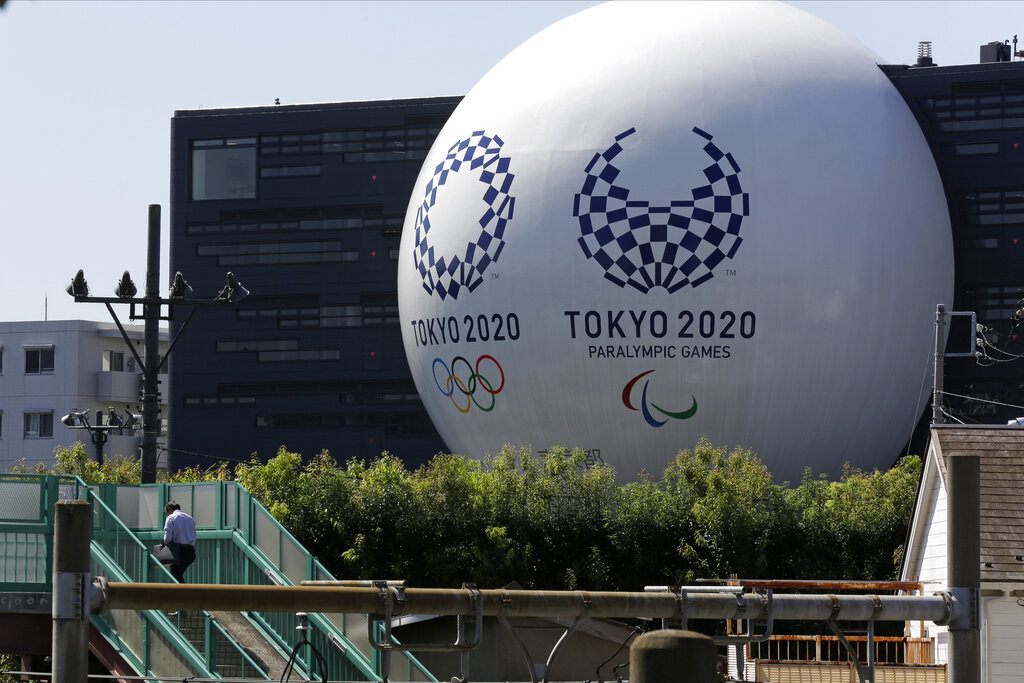
A man wearing a mask walks up on a pedestrian bridge over the train tracks Wednesday, Sept. 9, 2020, in Tokyo as a large display of Tokyo 2020 Olympics and Paralympics games are seen in the background. (AP Photo/Kiichiro Sato)
TOKYO– Even if the COVID-19 pandemic does not prevent the Tokyo Olympics from going ahead next year, the blazing summer heat in the Japanese capital could still make the Games “a nightmare,” an advisor to the organizing committee has told Reuters.
Although Japan enjoyed a mild summer this year, Makoto Yokohari said that the highest temperatures in a typical August — when most of the delayed Games will take place — could mean a dangerous mix of heat and humidity.
Yokohari, a professor of environment and urban planning at the University of Tokyo, analyzed data going back to the 1984 Olympics in Los Angeles and said he found that in the period where the Games were held, Tokyo had the highest average temperature and precipitation of any host city.
“When it comes to heat stress or heat stroke, the problem is not only the temperature but also the humidity as well,” Yokohari told Reuters on Tuesday.
“When you can combine these two … Tokyo is the worst in history.”
Temperatures this July, when the Olympics were due to start before the new coronavirus forced a postponement, were significantly cooler than the five-year average for the month of 30.4 degrees Celsius.
With August averaging highs of 30.8 degrees Celsius and lows of 24.2 over the 30 years over his study, Yokohari said organizers should be prepared for the worst.
“The temperature was not that high so if we could have this kind of weather next year, maybe it will be okay,” Yokohari added.
“But, if the weather turns out like right now, or like last year, then it is going to be a nightmare.”
HOTTEST TIME OF YEAR
The main reason for this year’s cooler July temperatures was the extended rainy season, which is often followed by the hottest time of year.
Yokohari said this was very unusual and that the rainy season in Tokyo habitually ended on or around July 20 — three days before the Olympics are due to start.
The 1964 Tokyo Olympic were held in October but for various reasons, including television deals and to avoid a clash with other major events, the International Olympic Committee (IOC) wanted the July dates kept even after postponement.
“If we could plan this postponed Olympic Games in November then I am sure the situation could be much, much better but unfortunately the IOC said ‘no, no, it is going to be in July,'” said Yokohari.
“Having said that, I am afraid that there isn’t going to be much we can do, especially for spectators.”
Last year, in response to a particularly hot summer, the IOC acknowledged the issues Tokyo’s heat would bring and moved the marathon and race walk events to the cooler northern city of Sapporo.
Before the COVID-19 pandemic struck, battling the heat was the major challenge for Games organizers.
“Tokyo 2020 and all the Japanese organizers are not optimistic about the summer weather in Tokyo at all,” Tokyo 2020 spokesman Masa Takaya said on Tuesday.
“We will be working closely together with the key delivery partners … to combat heat weather.”
With temperatures rising around the globe, Yokohari said the Tokyo Games could be a “gamechanger.”
“I would say that Tokyo should be a gamechanger of the whole story because, in the future, no cities in the world will be able to host Olympic Games in summer anymore,” he said.